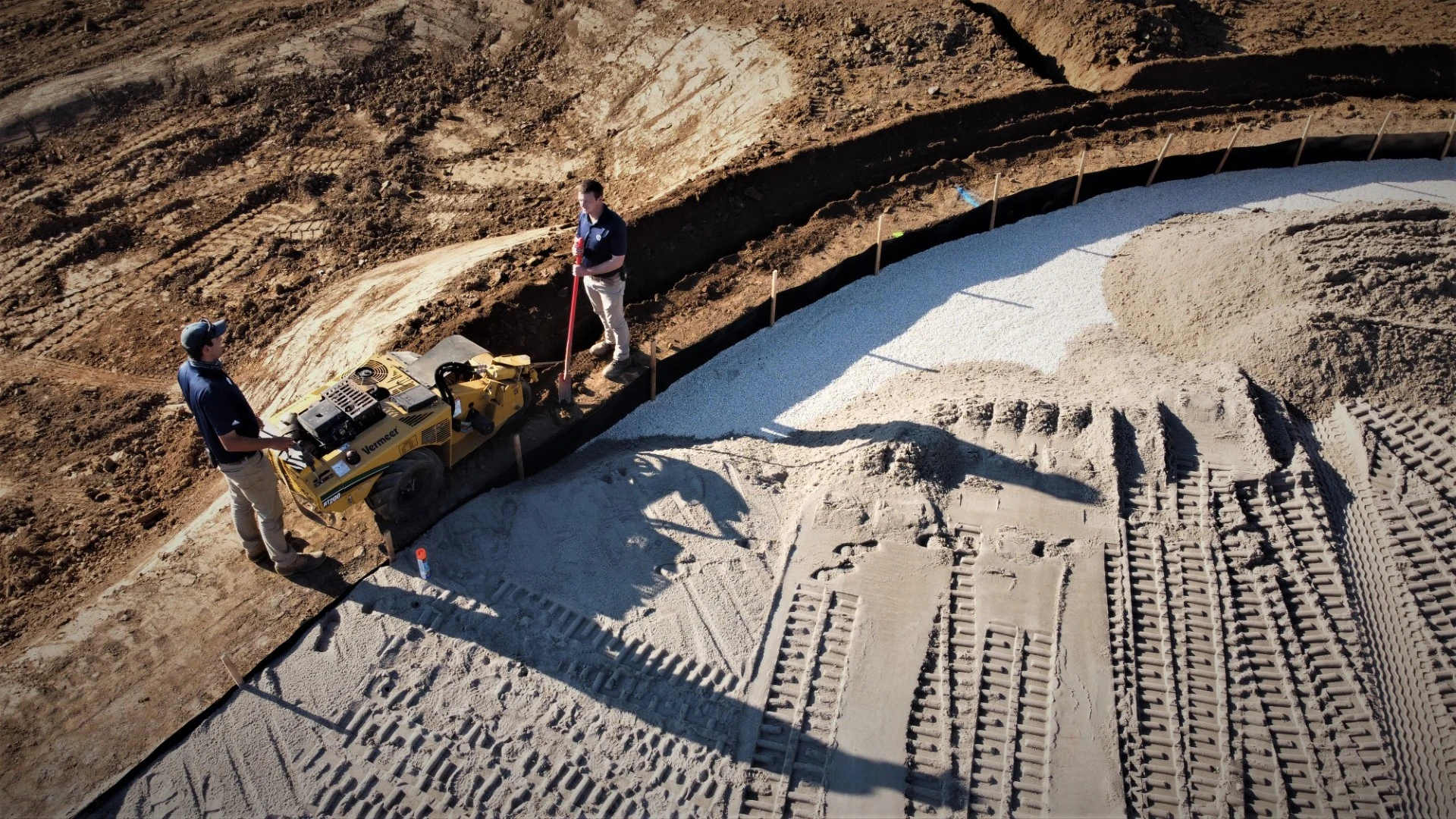
Superintendents aren’t accustomed to working extended stretches from home. Their jobs, after all, require making calculated decisions from the golf course. They plan and plot. They see. They do.
Yet Keith Wood, the director of green and grounds at Quail Hollow Club in Charlotte, North Carolina, spent part of this past spring working from home. The early stages of COVID-19 led to Wood and superintendent Shane Omann avoiding redundancies in their schedules. When one led the turf team from the course, the other performed behind-the-scenes tasks remotely.
Working from home in late March, Wood experienced the once unthinkable: he logged onto his computer and watched Omann spray fairways. Welcome to the modern era of turf spraying. Technology such as John Deere’s ProGator GPS PrecisionSprayer allows agronomists to study sprays like football coaches examining film.
Quail Hollow Club, home of the PGA Tour’s Wells Fargo Championship and site of the 2022 Presidents Cup, introduced a pair of the sprayers to its fleet in late March.

“One of the first times we were spraying fairways with the new sprayers we had just started the COVID-19 redundancy schedule,” Wood says. “Shane and I weren’t on the property at the same time in case one of us got sick so we would be able to keep going. Shane was like, ‘I’m going for it. We are going to spray fairways today.’ I’m sitting at home, pull up the op center and I’m watching these guys spray fairways.
“I’m looking at the mix that we talked about and I knew what he was putting in the tank. It was right in front of me in real time. I knew where the sprayers were going, what their output was, what nozzle was on, what nozzle was off, where the operator was, and I knew where play was supposed to be. That was a pretty cool moment for me.”
Wood and Omann are safely working on the championship greenspace simultaneously again as they continue to lead a team responsible for managing warm- and cool-season grasses. As spring shifted into summer, they continued tweaking how they manage personnel and agronomic programs in response to 2020 events.
Quail Hollow was supposed to host the 2020 Wells Fargo Championship in late April and early May. But the event was canceled because of a PGA Tour schedule shift caused by COVID-19.
Quail Hollow was also supposed to host the 2021 Presidents Cup. But the biennial match pitting a team of United States stalwarts vs. stars from nations outside Europe was moved to 2022 when the Ryder Cup shifted from 2020 to 2021. Delaying the Presidents Cup means Quail Hollow will host the 2021 Wells Fargo Championship, an event originally scheduled for TPC Potomac at Avenel Farm. TPC Potomac will host the 2022 event.
The changes significantly altered Quail Hollow’s 2020 agronomic calendar. The Wells Fargo is staged on overseeded playing surfaces, so the course must now be conditioned for a spring 2021 peak. The initial plan involved contesting the 2020 Wells Fargo on an overseeded course, spraying out the overseed, growing in Bermudagrass and allowing it to go dormant in preparation for a fall Presidents Cup in 2021.

The PGA Tour announced the cancelation of the 2020 Wells Fargo Championship on March 17. “This was probably our best presentation of the golf course that I have been a part of,” says Wood, whose team had hosted a televised tournament, including the 2017 PGA Championship, in each of his first five years at Quail Hollow. “We were so ready for a May tournament. That’s just the way it goes. You get ready and the rug gets pulled out from underneath you.”
Omann adds, “We had a great staff in place and we still do. Agronomically we were sound. We had a great stand of ryegrass and our transition points with our fairway cutlines came in great. We were thinking we were in “wax on, wax off’ mode.”
Greenville Turf & Tractor delivered the GPS PrecisionSprayers to Quail Hollow in March and the units figured to be key parts in final Wells Fargo Championship preparations. The Quail Hollow team had familiarity with GPS and demonstrated little trepidation incorporating the John Deere platform into its programs. Omann participated in the first application, which involved spraying a growth regulator in ryegrass rough.
Before the maiden spray, Omann set boundaries by mapping 110 acres of rough and 26 acres of fairways and tees. The GPS PrecisionSprayer uses Real Time Kinetic (RTK) satellite navigation through the StarFire 6000 receiver to establish reliable boundaries. Mapping is a one-time process. Omann says it took two hours to map fairways and two more hours to map tees. Mapping the rough took longer because the sprayer must operate around bunkers and landscape areas. “If you can spray with your basic sprayer, transitioning to the fundamentals of a GPS sprayer is very similar,” Omann says.
AutoTrac with RTK allows the ProGator GPS PrecisionSprayer to be guided down predetermined tracks to prevent overspray. AutoTrac allows for increased operator comfort and repeatable guidance in curves and straight tracks. If an operator notices an issue such as localized dry spots or tree damage, a digital pin can be dropped into the display, creating an action item in real time. Records are accumulated during sprays and data can be viewed on desktops, laptops and mobile devices. Neither Wood nor Omann needs to be on property to concoct tank mixes and track applications.
The GPS PrecisionSprayer represents the most recent example of John Deere leveraging successful agriculture practices into turf maintenance. The company has spent the past 20 years integrating GPS into agriculture operations. Wood and Omann collaborated with Greenville Turf & Tractor’s Rick Henderson on setup. Henderson serves as a liaison between Quail Hollow and the John Deere technical support team.
“What John Deere is bringing to the market with the RTK and being in Charlotte where we can get mobile RTK was big for us,” Wood says. “We felt good about our relationship with John Deere and Greenville Turf & Tractor and knew if we had challenges, we would get support. That was a real big thing, understanding John Deere has the technology and capabilities. They have been doing this for years in agricultural and have been able to refine the process to get it on the turf market.”
A combination of precision applications and extensive recordkeeping could help golf further boost its environmental profile within communities. Quail Hollow, for example, has a lake on the interior of its back nine. The lake is stocked with fish and individual nozzle control on the GPS Precision Sprayer offers one more additional layer of protection between areas requiring pesticide and fertilizer applications and the lake.
“In just the five months we have had the sprayers we have been able to see how we are more accurate with our applications, which, in turn, is going to be better for environment,” Wood says. “The industry was already good at managing pesticides, but we can now take it to the next step and become very precise with applications.”
Each spray in 2020 has provided opportunities to observe short-term triumphs (defined lines between fairways and rough) and ponder long-term benefits (financial savings via input reductions) of GPS technology. For a facility such as Quail Hollow, which sprays year-round, the possibilities proved intriguing enough to purchase two units. Superintendents are a curious lot and additional questions and answers about the potential of GPS are emerging.
“Shane and I have both talked about it quite a bit,” Wood says. “There are all kinds of different ways to take advantage of GPS — not just mowing and spraying — and hopefully John Deere will put together a nice platform to build off what they already have.” ?

Explore the September 2020 Issue
Check out more from this issue and find your next story to read.
Latest from Golf Course Industry
- Standard Golf announces new product lineup for 2025
- The Salt Pond taps Troon for management
- KemperSports selected to manage Swansea Country Club
- From the publisher’s pen: Grab that guide
- Introducing our April 2025 issue
- South Carolina leaders honor golf course superintendent
- One and only
- Wild can be good





